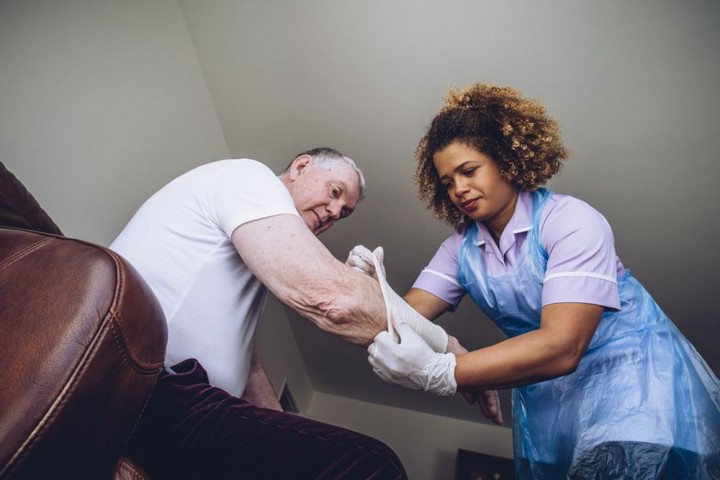Home Care Workers in NYC
 A home health aide assisting a patient.
A home health aide assisting a patient.
Home care workers (HCWs) are frontline healthcare workers who provide critical rehabilitative and long-term care services within patients’ own homes. They are minimally paid, with varying degrees of training, tend to be women from ethnic minority and low-income backgrounds, and critically, they feel underappreciated by the public and other parts of the healthcare system.
As they work directly in patients’ homes and not in a traditional office or clinic setting, aides have few opportunities to meet each other. This prevents HCWs from being able to talk to each other to share experiences, knowledge, create norms around good practice, and reduces opportunities to collectivize and mobilize around common issues.
Anthony Poon
Senior Technical Advisor
ICTD and technology for socialization, practitioners, and peer support.
Related
- Experiences of Home Health Care Workers in New York City During the Coronavirus Disease 2019 Pandemic
- Designing for Peer-Led Critical Pedagogies in Computer-Mediated Support Groups for Home Care Workers
- Computer-Mediated Sharing Circles for Intersectional Peer Support with Home Care Workers
- Development and Piloting of a Community-Partnered Heart Failure Training Course for Home Health Care Workers
- Computer-Mediated Peer Support Needs of Home Care Workers: Emotional Labor & the Politics of Professionalism
Publications
Designing for Peer-Led Critical Pedagogies in Computer-Mediated Support Groups for Home Care Workers
Computer-Mediated Sharing Circles for Intersectional Peer Support with Home Care Workers
Home care workers (HCWs) provide essential care in patients’ homes but are often underappreciated and work in stressful and isolated environments with diverse and intersecting support needs. This paper describes a computer-mediated peer support program that centers around sharing circles: spaces for personal, narrative storytelling to encourage HCWs to collaboratively reflect on their home care experiences and build rapport and shared identity with their peers. Our findings show that participants engaged in multiple types of peer support, and we discuss how computer-mediated programs can address diverse needs that occur in intersectional contexts.
Awarded a Recognition for Contribution to Diversity & Inclusion.
Development and Piloting of a Community-Partnered Heart Failure Training Course for Home Health Care Workers
Computer-Mediated Peer Support Needs of Home Care Workers: Emotional Labor & the Politics of Professionalism
Home care workers (HCWs) provide in-home care services but feel underappreciated and isolated on the job. Leveraging the support of peers is one way to empower HCWs, but there are barriers to doing so due to the distributed nature of home care worker. In this study, we explore how HCWs value and conceptualize peer support, especially around needs of performing emotional labor and professionalization, and provide design implications for technology-enabled peer support.
Awarded a Recognition for Contribution to Diversity & Inclusion.
Experiences of Home Health Care Workers in New York City During the Coronavirus Disease 2019 Pandemic
Question: What are the experiences of home health care workers caring for older adults and for patients with chronic illnesses during the coronavirus disease 2019 (COVID-19) pandemic?
Findings: In this qualitative study of 33 home health care workers employed by 24 unique home care agencies across New York City, participants reported that they were at heightened risk for contracting and transmitting COVID-19. Despite providing integral care to vulnerable patients, home health care workers felt inadequately supported and generally invisible.
Meaning: During the COVID-19 pandemic, home health care workers experienced challenges that increased their vulnerability as a workforce.




